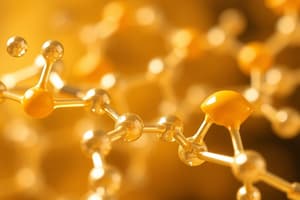Podcast
Questions and Answers
What are polymers?
What are polymers?
Polymers are substances or materials consisting of very large molecules called macromolecules, composed of many repeating subunits.
How are polymers created?
How are polymers created?
Polymers, both natural and synthetic, are created via polymerization of many small molecules, known as monomers.
Who coined the term 'polymer' and when?
Who coined the term 'polymer' and when?
The term 'polymer' was coined in 1833 by Jöns Jacob Berzelius.
What are some unique physical properties of polymers?
What are some unique physical properties of polymers?
In which fields are polymers studied?
In which fields are polymers studied?
Flashcards are hidden until you start studying
Study Notes
What are Polymers?
- Polymers are large molecules composed of repeating units of smaller molecules (monomers) bonded together.
- They can be naturally occurring or synthetic.
Creation of Polymers
- Polymers are created through a process called polymerization, which involves the reaction of many small molecules to form a large molecule.
- There are several types of polymerization, including condensation, addition, and ring-opening reactions.
Origin of the Term 'Polymer'
- The term 'polymer' was coined by German chemist Hermann Staudinger in 1920.
- Staudinger was awarded the Nobel Prize in Chemistry in 1953 for his contributions to the field of polymers.
Physical Properties of Polymers
- Polymers can exhibit unique physical properties, including elasticity, conductivity, and optical properties.
- Their properties can be tailored by adjusting their molecular structure and composition.
Fields of Study for Polymers
- Polymers are studied in various fields, including materials science, chemistry, biology, and engineering.
- They have applications in industries such as textiles, plastics, adhesives, and biomaterials.
Studying That Suits You
Use AI to generate personalized quizzes and flashcards to suit your learning preferences.




